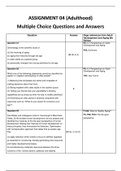ASSIGNMENT 04 (Adulthood)
Multiple Choice Questions and Answers
Question Answer Page references from Adult
Development and Aging 8th
Edition
Question 01 P3, 1.1 Perspectives on Adult
Development and Aging
Gerontology is the scientific study of
P25, Summary
(a) the meaning of aging
(2) (b) & (c)
(b) aging from maturity through old age
(c) older adults as a special group
(d) personality changes from young adulthood to old age
Question 02 P3, 1.1 Perspectives on Adult
Development and Aging
Which one of the following statements cannot be classified as
ageism or negative stereotyping of older people? P27, Key Terms
(1) Believing that old people are senile and incapable of
making decisions about their lives.
(2) Being impatient with older adults in the cashier queue.
3
(3) Telling your friends that your grandfather’s thinking
capabilities are as sharp as when he was in middle adulthood.
(4) Dismissing an older person’s physical complaints with
responses such as “What do you expect for someone your
age”?
Question 03 P 408, What Is Healthy Aging?
P4, P28, P410 The life-span
Paul Baltes and colleagues (cited in Cavanaugh & Blanchard-
Fields, 2019) divided human development into two phases and perspective
identified four features of the life-span perspective of human
development. Basing their theories of human development on
these principles, they formulated the Selective, Optimisation
with Compensation approach that states that as people age,
they (2) (a), (c) & (d)
(a) apply selection which entails a focus on abilities regarded
as essential for functioning, thereby generating new resources
and higher developmental states.
(b) simultaneously reallocate resources between the three
functions of life, namely decline, plasticity and stability.




